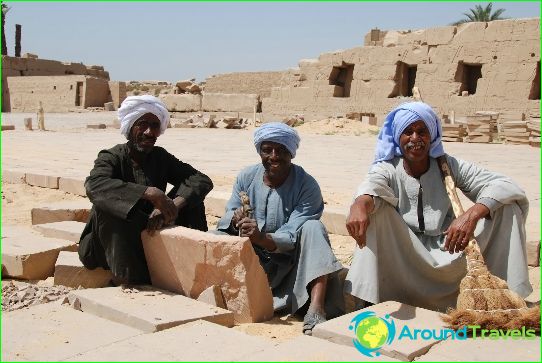Population of egypt
Egypt has a population of 87 million.
National composition:
- Egyptians (Arabs);
- Nubians, Berbers, Lebanese;
- Greeks, French, Italians;
- other nations.
Most Egyptians (94%) are Muslim, while the rest (6%) are Coptic Christians.
The official language is Arabic, but languages such as English, French and Berber are widespread in Egypt..
Major cities: Cairo, Giza, Alexandria, Luxor, Port Said.
Despite the fact that on average 75 people live per 1 km2, the Nile River valley is a densely populated area (1700 people live here per 1 km2), and the desert is less populated (only 1 person lives here per 1 km2).
Life span
Men in Egypt live on average to 68 and women to 73.
People's lives are often carried away by HIV / AIDS, infectious diseases (typhoid fever, hepatitis A).
If you are going to Egypt, do not drink tap water (only bottled), do not walk barefoot along the banks of the Nile, do not swim in the Nile and canals (there is a risk of catching an infection). And get vaccinated against tetanus and polio before traveling (when planning trips to deserts and oases, get vaccinated against hepatitis A and malaria).
Traditions and customs of the inhabitants of Egypt
Many Egyptian traditions are inextricably linked with religion.
The religiousness of the Egyptians does not prevent them from being tolerant towards representatives of other faiths. For example, Egypt provides an opportunity for tourists to consume alcoholic beverages and order pork dishes in restaurants (Muslims are prohibited from drinking strong drinks and eating the meat of a sacred animal).
The Egyptians are used to living according to the regime - they pray 5 times a day, and, for example, during the celebration of Ramadan, they eat and drink only after sunset.
The Egyptians are very sensitive to family ties - several generations often live under one roof. But even if families live separately, they are still in warm, friendly relations, and they all come together during the celebration of holidays and memorable dates..
Wedding traditions in Egypt are no less interesting. Even today, a tradition has been preserved according to which the parents of future newlyweds, long before the age of marriage, draw up an agreement that their children should get married. But not every family follows this tradition - young people are increasingly violating it..
Egyptians are a superstitious people: they believe in omens, are afraid of the evil eye and envy, so they carry with them various amulets and talismans.
For example, in order to protect children from the evil eye, the Egyptians dress them in old clothes and hide their real names, using nicknames or unattractive nicknames in communication (the Egyptians believe that this is how they save children from evil forces).
Going to Egypt? Do not praise Egyptians and their children or make fun of their superstitions..



